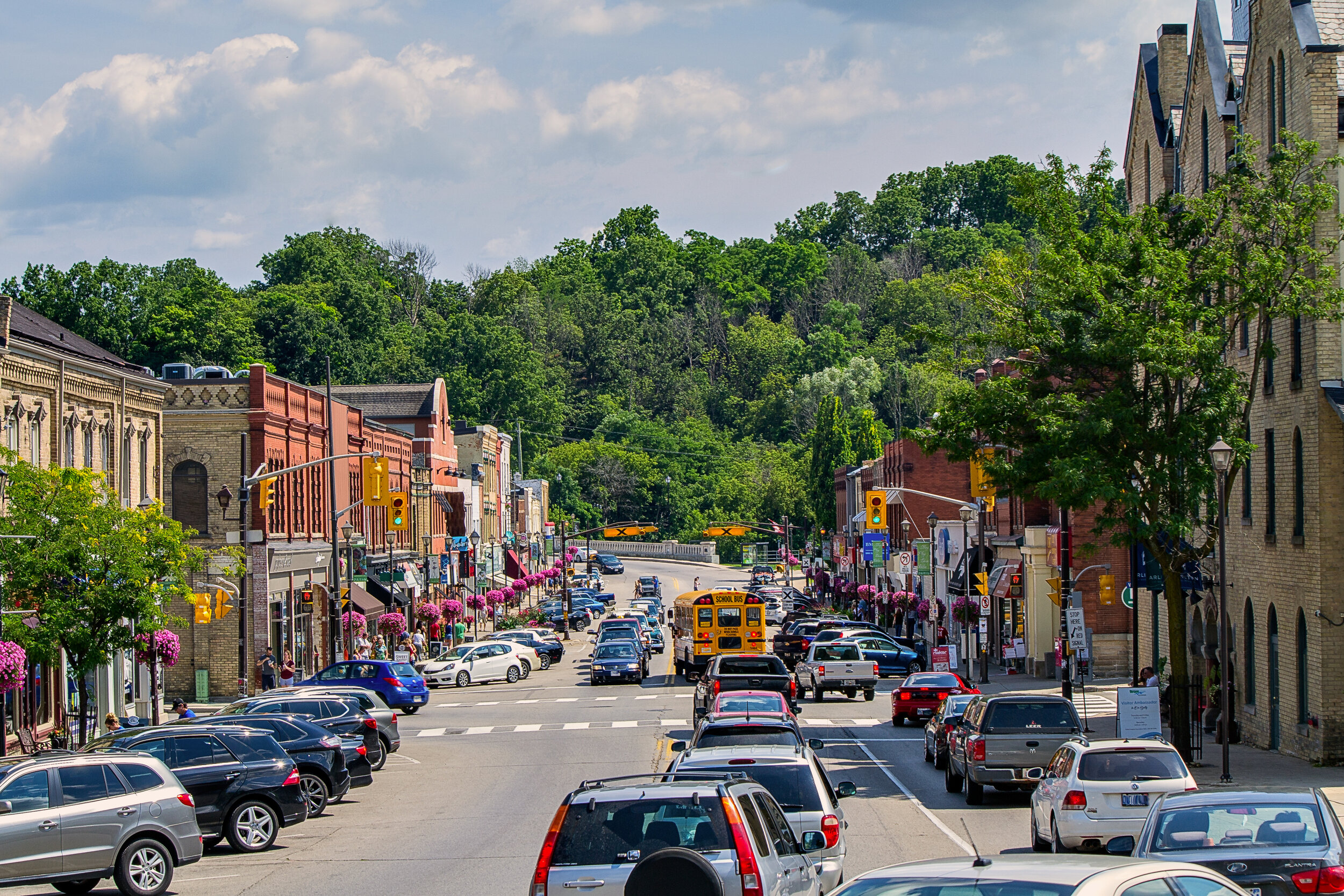

main street retailers in paris, ontario
By Mario Toneguzzi
Strong local economies have reaped a protective effect for main streets and small businesses through the pandemic, according to a report by the Canadian Urban Institute through its Bring Back Main Street initiative.
To better understand how COVID-19 has impacted main streets and businesses, Vancouver City Savings Credit Union, Vancity Community Investment Bank, and the Canadian Urban Institute conducted a series of seven Block Studies in British Columbia and Ontario.
“Generally, the blocks with more independently-owned businesses that more directly catered to the needs of the local residential population were faring better. The small businesses that had personal connections to their customers were seeing the people in their communities support them throughout the pandemic. Similarly, ethnic businesses saw their customers go out of their way to purchase their products and services, even during the lockdown phase,” said the report.
SEVEN BLOCK STUDIES IN B.C. AND ONTARIO HIGHLIGHTED IMPACT OF COVID-19 ON MAIN STREET RETAIL
Key findings include:
-
Strong local economies and connections to the community are helping businesses through COVID-19;
-
Main streets and businesses that cater to local residential populations are seeing advantages;
-
Main streets that were struggling with vacancy and rising rents pre-COVID may be at higher risk;
-
The business community is digging deep and finding innovative ways to adapt, but some are falling behind;
-
There is a need for creative ways to finance small businesses and support recovery;
-
Filling vacant storefronts and animating main streets will be necessary for main street recovery; and
-
Local business organizations are critical to the recovery and resilience of main streets.
Mary Rowe, President and CEO of the Canadian Urban Institute, said the organization is focused on healthy urban development and how to foster connectivity that enhances communities.
“Main streets are kind of the embodiment of why a city even forms in the first place. Cities are typically formed because people wanted to gather and exchange. That’s the root of the city,” said Rowe. “In any urban environment you will see that historic pattern where people are organized around a place where they can exchange goods or services and where they can congregate and do something together that they can’t do alone.”
The Block Study looked at the following seven areas: Downtown, Victoria; Strathcona, Vancouver; Kamloops North Shore; Newton, Surrey; Downtown Hamilton, Wexford Heights, Toronto; and Beach Village, Toronto.
“We are really exploring and learning as best we can what are the ingredients to make a main street for the future and what’s that going to look like,” said Rowe.
“Main streets aren’t just about buying stuff. Main streets are about community. They’re about a sense of belonging – an attachment. They’re about your sense of wellbeing. They’re about public safety. If a street has a lot of commercial activity and a mix of activity . . . these all make a street much safer, makes it a place that you’re more attached to.”
‘BRING BACK MAIN STREET’ INITIATIVE IS FOCUSED ON MITIGATING COVID STRUGGLES EXPERIENCED BY MAIN STREET RETAIL
Bring Back Main Street is a nationally-coordinated research and advocacy campaign about finding the best solutions to ensure main streets recover from COVID-19 and emerge from the crisis more resilient than ever.
“We’re working with a growing coalition of partners on this project, including: main street business leaders, academic research partners, industry and professional associations, BIAs/BIDs across Canada, government stakeholders and municipal recovery working groups, corporate endorsers, developers, industry and professional associations, and advocacy groups across Canada,” says the initiative on its website.
“We are undertaking rapid-response research and developing a set of tools to inform shared priorities and gaps across Canada. We’re leveraging dozens of partnerships and networks across the country to develop tangible, evidence-informed, and actionable policy recommendations to inform a plan for recovery. We are building a campaign about the value of our main streets – their connection to the health of the economy, social life, and vitality of our neighbourhoods and cities – and the actions that we can all take to guarantee their survival.”
Jay-Ann Gilfoy, CEO of Vancity Community Investment Bank, said having a vibrant community is really important particularly at this time — a thriving community is a place where people collectively can succeed.
“So I can live and shop and work and have my children taken care of, have friendships and relationships, those are the healthy communities that I think we all want to live in. The small business component of a community is as important as the social services that get applied to that community, as the residents who live there who want to do things in their community together. It’s kind of an ecosystem that needs to work together,” she said.


Mario Toneguzzi, based in Calgary has 37 years of experience as a daily newspaper writer, columnist and editor. He worked for 35 years at the Calgary Herald covering sports, crime, politics, health, city and breaking news, and business. For 12 years as a business writer, his main beats were commercial and residential real estate, retail, small business and general economic news. He nows works on his own as a freelance writer and consultant in communications and media relations/training. Email: mdtoneguzzi@gmail.com.
TODAY’S TOP HEADLINES



![World’s 1st VUSE Storefront Opens in Downtown Toronto [Photos]](https://images.squarespace-cdn.com/content/v1/529fc0c0e4b088b079c3fb6d/1600809478182-51W99YAKSS061WZZZEA4/ke17ZwdGBToddI8pDm48kGhF2FCaXCFJZFEalRo8kqUUqsxRUqqbr1mOJYKfIPR7LoDQ9mXPOjoJoqy81S2I8N_N4V1vUb5AoIIIbLZhVYxCRW4BPu10St3TBAUQYVKc-1xO4ojbyXh6pGHoSehGwJrj31ldwyDpM9XrZmSoQV1hiaei2FKmHe5-h9rSbF7s/Screen%2BShot%2B2020-09-22%2Bat%2B5.03.35%2BPM.jpg)




